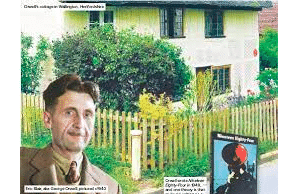The connections between resisting totalitarianism and engaging with the tactile world.
In Conversation with Paul Holdengräber on The Quarantine Tapes
Hosted by Paul Holdengräber, The Quarantine Tapes chronicles shifting paradigms in the age of social distancing. Each day, Paul calls a guest for a brief discussion about how they are experiencing the global pandemic.
*
On Episode 191 of The Quarantine Tapes, Paul Holdengräber is joined by Rebecca Solnit. Rebecca and Paul think back to a year ago, nearly to the day, when Rebecca was sharing fairy tales online in the early days of the pandemic. She tells Paul about her upcoming book on George Orwell, Orwell’s Roses, and reflects on what kinds of connections she has seen arise out of the isolation of this past year.
Rebecca offers Paul beautiful observations from her walks in nature. As a climate activist, she talks about the interesting implications of this moment of great change for the climate movement and discusses how the work of both activists and artists is to invite people to imagine.
From the episode:
Paul Holdengräber: There’s one quotation of Orwell you particularly love, I take it, which comes back to this notion of trusting our senses. Orwell says, “The party told you to reject the evidence of your eyes and ears. It was their final, most essential command.” I had occasion not long ago to speak with Terry Tempest Williams, who has a wonderful line where she says, “But something changed. It’s a dismemberment of a territory. I’m interested now in what my eyes can see, what my fingers can touch, what my hand can know by moving across flesh or fur of feathers or stone. I trust what I see on the surface of things. I trust what I touch. The surface of things is what I touch.” And reading about this book that is forthcoming, I’m wondering if you could reveal some of it without giving it away.
Rebecca Solnit: That extraordinary line from 1984, the party’s final and most important instruction was not to trust the evidence of your eyes and ears, is both so Donald Trumpy—and there have been many moments in which he actually told people not to believe the evidence and not to listen to anyone but him about what had happened—but it’s also something, I started inverting all these things. Very similarly, Hannah Arendt says the ideal subject to totalitarianism is a person for whom the distinction between truth and falsity is meaningless, which means that the great enemy of totalitarianism is a person who is actually very clear on the difference and committed to continually discerning it and defending it.
And with the line from 1984, you invert it and then you see to resist Big Brother, to resist this form of propaganda-driven totalitarianism, would mean trusting the evidence of your eyes and ears, would mean that empirical experience in the life of the senses, just as my dear friend Terry Tempest Williams outlines, is actually—though often dismissed as trivial, recreational, distracted, indulgent, all these things that anything other than toiling in the fields of Marxism, according to the rules or whatever, are so often called—but this stuff is actually really important, sometimes directly as acts of resistance, sometimes as building a self who’s capable of resistance.
Read the transcript at https://lithub.com/rebecca-solnit-why-it-matters-that-george-orwell-was-a-gardener/




